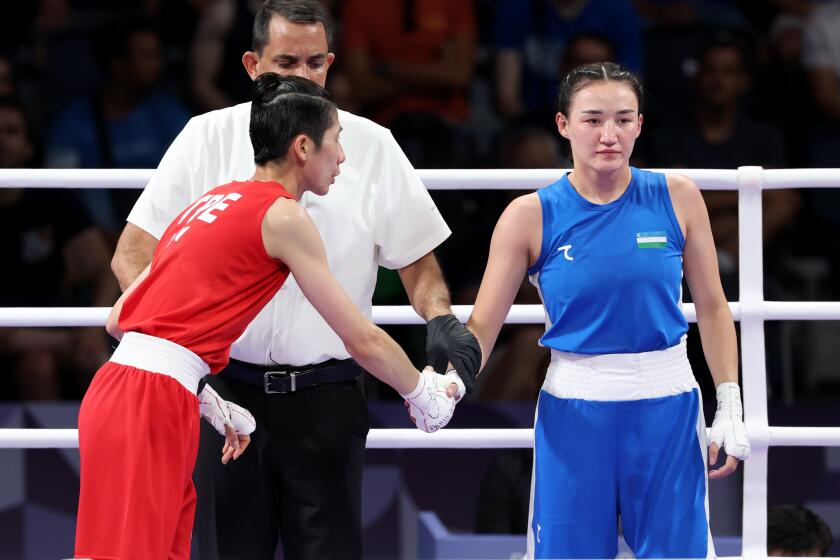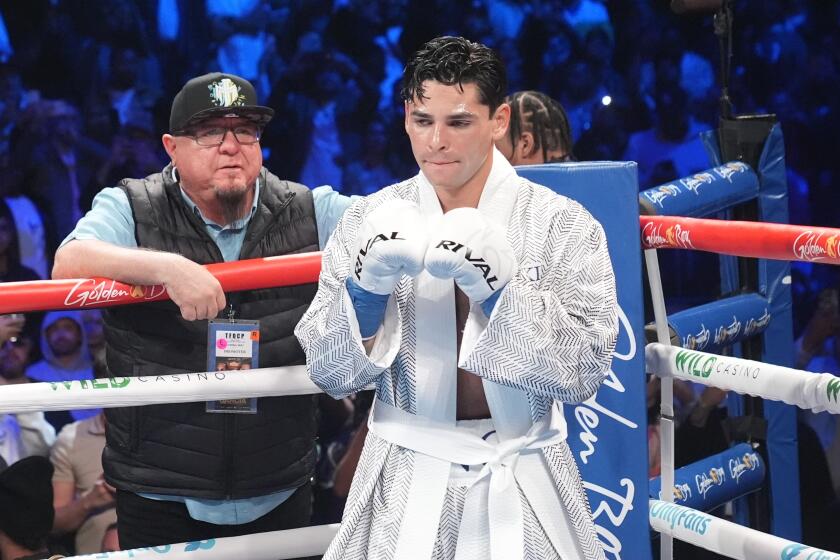Knockout Portrayal but Little Finesse in ‘Tyson’
You can’t beat the timing. Out pops Mike Tyson from prison, out pops a movie about his life from HBO. So get ready to rumbllllllle !!!
Perhaps not. But even though it feints more than it connects, Saturday’s “Tyson” is worth its airtime if only because of Michael Jai White’s glowering, seething, raging Iron Mike. Half lisp, half lion, White is remarkably persuasive in the difficult task of playing (without merely mimicking) someone whose life has been a banner headline and whose distinctive mug and speech are known to the multitudes.
“Tyson” has a lot to try to live up to. Just as there’s never been a boxing movie equal to Martin Scorsese’s “Raging Bull,” there’s never been a better, more transcendent sports biography on television than Barbara Kopple’s haymaker documentary about Tyson that first aired on NBC in 1993, less than a year after he began doing time for the rape of Desiree Washington.
In “Fallen Champ: The Untold Story of Mike Tyson,” Kopple sketched her subject’s life as part triumph--bad boy from the streets earns fame and millions in the ring--part commentary on the culture and social climate that nurtured the inner demons that brought him down.
The thunderbolt at the end of her film was devastating footage of a “Free Mike” rally at which Nation of Islam leader Louis Farrakhan had his African American audience in stitches while cynically dismissing Tyson’s crudeness and mocking Washington’s claim that he forced sex on her after she willingly had gone to his hotel room in Indianapolis, where she was competing for Miss Black America.
“You bring in a hawk at the chicken yard and wonder why the chicken got eaten up,” Farrakhan scoffed, just warming up. “You bring Mike to a beauty contest, and these foxes just parading in front of Mike. . . . Mike’s eyes begin to dance like a hungry man looking at a Wendy’s beef burger or something.” For emphasis, he made lewd, groping gestures with his hands, to the delight of many in the audience.
A smirking Farrakhan also ridiculed Washington’s testimony that she seriously rejected Tyson’s sexual advances: “I mean, how many times, sisters, have you said no, and you mean yes all the time?” He then affected a female’s squealing voice: “She said, ‘No, Mike, no.’ ”
The laughter in the room spoke for itself, as did Farrakhan’s prehistoric musings on women--attitudes that he eagerly bared to a TV camera as obscenely as a flasher ripping open his raincoat. The stench of misogyny was overpowering, recalling the pockets of scorn greeting University of Oklahoma law professor Anita Faye Hill in 1991 when she publicly charged then Supreme Court nominee Clarence Thomas with salacious conduct unbecoming an associate justice. Like Hill, Washington was accused by many African Americans and others of lying to advance a private agenda and thereby participating in the symbolic racist lynching of a black man. As if the women themselves were not black.
In taking risks with a stinging point of view, Kopple’s brilliant, stylish film used its canvas to the fullest. The absence of a wider vision and connection to a larger universe is what prevents HBO’s “Tyson” from being more than just an above-average, chronological biography of a man whose well-publicized strengths and flaws are by this time no mystery. The mystery is what’s inside.
What the movie does have is a performance by White so convincing in its disturbing yet poignant tone that by movie’s end you’d swear he and the enigmatic Tyson are clones, although they look nothing alike. Inside the ring, Tyson’s fists are sledgehammers that pound foes to the canvas. Even while playing Tyson as unstable and dangerously violent outside the ring, though, White somehow manages to tap our sympathy for this self-destructive figure.
Also wedged into “Tyson” is Paul Winfield’s winning version of fight promoter Don King, who looks as if he just beamed down from Pluto. In other words, he’s as bizarre here as the real King, surfacing in Tyson’s life like a hair-whizzed Lucifer, a brutal, deceptively clownish and syrupy manipulator famous for his monumental spiky coif and insincerity.
*
Based largely on “Fire & Fear: The Inside Story of Mike Tyson” by former light-heavyweight champ Jose Torres, Robert Johnson’s script has Brooklyn street thug Tyson trading his street life as a junior terror (38 arrests by age 13) for the homier, sheltered Catskills abode of famed boxing manager-trainer Cus D’Amato (George C. Scott). It’s at this live-in compound for young fighters that D’Amato tenaciously tutors his powerful 14-year-old protege in the ways of the ring. The kid “hits with bad intentions,” Cus observes. Soon he and his longtime companion, Camille Ewald (Lilyan Chauvin), become Tyson’s surrogate parents.
Even before he turns 16, Tyson is destroying opponents in the Junior Olympics and D’Amato is dubbing his volatile, still-misbehaving student “the next great heavyweight champion.” Before Tyson does become the youngest-ever heavyweight champ, D’Amato dies, leaving a crater-sized void in his life. Soon the jackals will move in on Tyson and his career.
Directed by Uli Edel, “Tyson” tells a good story even though depicting the now-familiar traits of its protagonist, a complex puzzle whose baby-soft voice and innate shyness belie his tornadic rages. This is an angry, angry man. The post-Cus era finds Tyson’s timidity and violent wrath merging during his brief, turbulent marriage to TV actress Robin Givens (Kristen Wilson), who is fused at the hip with her mother, Ruth Roper (Sheila Wills), portrayed here as a controlling witch.
Tyson has to muster his courage just to call Givens for a date. Soon they’re having sex in the back seat of a moving stretch limo, and soon after that they wed and move into a New Jersey mansion, which Tyson tears up like he does boxing opponents after Givens tells Barbara Walters on TV that her husband is an out-of-control manic depressive.
The couple splits, Tyson subsequently careening downhill toward his thunderous defeat by the unlikely Buster Douglas and then on to that promotional appearance at Indianapolis where the man who was heavyweight champ at 20 becomes a convicted felon at 25. Not a pretty picture, not a pretty man.
* “Tyson” airs 8-10 p.m. Saturday on HBO.
More to Read
Go beyond the scoreboard
Get the latest on L.A.'s teams in the daily Sports Report newsletter.
You may occasionally receive promotional content from the Los Angeles Times.










